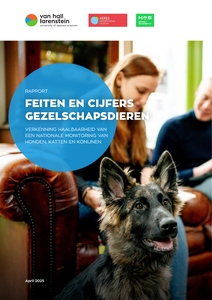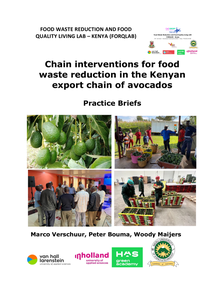From the article: "This article evaluates the application of blockchain technology to improve organic or fair-trade food traceability from “Farm to Fork” in light of European regulations. This study aims to shed light on the challenges in the organic food chain to overcome, the drivers for blockchain technology, and the challenges in current projects."
DOCUMENT

The textiles and apparel industry is a major contributor to economic development while at the same time being one of the most polluting industries due to its lengthy supply chain and resource intensive production operations. To address these sustainability challenges, digitalization is seen as one of the potential solutions. Using the lens of sustainability and digitalization in Supply Chain Management (SCM), this paper analyses the sustainability and digitalization status of Dutch textile and apparel firms. We used a mixed methodology of quantitative text mining of 94 Dutch textile and apparel firms as well as qualitative thematic and coding analysis of experts’ views and opinions on sustainability and digitalization in the Dutch textiles and apparel industry. Quantitative analysis of website data shows that Dutch textile and apparel firms predominantly communicate the environmental, to a lesser extent social, and least of all economic sustainability factors. Keyword analysis also shows that the use of technological keyword indicators is less prominent, while certain technologies such as IoT, sensors and blockchain correlate mostly to environmental sustainability factors. Moreover, qualitative analysis reveals that to address sustainability via digitalization, it is important to link sustainability goals to Key Performance Indicators, which requires data for traceability. We recommend firms to: (1) re-evaluate their business models and assess the extent traceability can be incorporated in their sustainability strategy; (2) enhance stakeholder collaboration within and outside the supply chain to utilize traceability; and (3) proactively use traceability information to improve transparency and accountability to meet legal requirements and address greenwashing. This study contributes to literature by showing the importance of traceability for (a) linking sustainability and digitalization in SCM, b) achieving the ultimate goals of transparency and accountability, and c) predicting demand and supply to address overproduction and waste in the textiles and apparel sector.
MULTIFILE

From the article: Abstract Since more and more business rules management solutions are utilized, organizations search for guidance to design such solutions. Principles are often applied to guide the design of information systems in general. Scientific research on principles for business rules management is limited. The purpose of this paper is to specify, classify, and validate design principles that can be applied to guide the design of a business rules management solution. We conducted a three round focus group and three round Delphi Study, which led to the identification of 22 principles. These 22 principles can be clustered into four categories: 1) deep structure principles, 2) physical structure principles, 3) surface structure principles, and 4) organizational structure principles. Our results provide a framework for the design and analysis of business rules management solutions.
LINK
Licence CC BYReviewed by Jan Veuger.Blockchain implications within the sustainability domain are rapidly arousing the interest of researchers and institutions. However, despite the avalanche of articles, papers, and recently published books, innovation in the blockchain domain is still heavily influenced by light literature, such as news, articles, opinion posts, and white papers. Lacking a homogeneous literature background, case studies often fall into storytelling, providing mere descriptions of the facts according to the writers’ impressions and opinions. We therefore investigate blockchain adoption for sustainable purposes through a case study while remaining firmly grounded in three main theoretical literature streams: knowledge management, knowledge infrastructure, and trust. Since blockchain interaction with the real world is managed by oracles, addressing the oracle problem is essential in order to evaluate the effectiveness of blockchain for sustainability issues. However, to the best of the authors’ knowledge, no other paper has efficiently addressed this subject or even mentioned it. Recognizing its scarce consideration in the literature, the oracle problem will be analyzed in both theoretical and practical terms, thereby providing a way to solve the issues related to non-fungible products in the supply chain. Choice over the selected case study was made in light of the divergence in motives for the adoption of blockchain (economic over social), which makes the results more inferable at a broader scale and offers an insight into how sustainable innovations can also be economically viable
LINK
Calibration of spectral imaging instruments is a prerequisite for many applications, in particular in the field of Earth observation. In this contribution we will present a novel traceability route to celebrate spectral imaging instruments, based on tunable radiance source that is referenced to a primary detector standard.
DOCUMENT

The Circular Wood 4.0 Workflow API is a comprehensive and automated “file-to-factory” system that bridges the gap between design using waste wood resources and production processes aligned with Smart Industry principles. This software serves as the core IT infrastructure for an end-to-end automated workflow, enabling seamless data flow from material availability to final production. Key features include full traceability, real-time process monitoring, and integration of design and manufacturing stages. The API is composed of several interconnected components that manage the entire workflow, from intelligent resource matching and design generation to production preparation and execution; facilitating efficient, sustainable, and transparent fabrication processes.
LINK
Wanneer een beslisarchitectuur is geformuleerd, dan is daarna vaak de vraag hoe iedere individueel gespecificeerde beslissing uitgewerkt dient te worden. Gaan we voor een beslissing elk van de onderliggende bedrijfsregels volledig specificeren? Dient er een predictive analytics engine te komen of is het beter om een mens de beslissing te laten nemen?
LINK
Precieze cijfers en feiten over gezelschapsdieren ontbreken in Nederland. Huidige gegevens over bijvoorbeeld het aantal huisdieren zijn vooral gebaseerd op schattingen. Het ontbreken van inzicht en bewijslast op basis van nauwkeurige en actuele feiten en cijfers kan negatieve gevolgen hebben voor onder andere zorgkwaliteit, voorlichting en toezicht op dierenwelzijn en diergezondheid.Het ministerie van Landbouw, Visserij, Voedselzekerheid en Natuur (LVVN) heeft drie groene hogescholen de opdracht gegeven om te verkennen of het haalbaar is een landelijke structurele monitoring van feiten en cijfers over gezelschapsdieren op te zetten. En dat te vertalen naar aanbevelingen. De verkenning richtte zich op de diergroepen hond, kat en konijn. Er zijn interviews afgenomen bij overheid(sdiensten), NGO’s, brancheorganisaties, kennisinstellingen en één handelsplatform. Aanvullend is specifiek voor de hondensector in twee aan het project gerelateerde afstudeeronderzoeken informatie verkregen over dataverzameling en monitoring. Eén onderzoek richtte zich op de hele sector, de andere op dataverzameling binnen dierenasielen. Hiervoor zijn ook interviews afgenomen en deskstudies uitgevoerd. Deze informatie tezamen geeft inzicht in belangen en doelen van belanghebbenden, de meest relevante data, haalbaarheid, draagvlak en goede praktijken die als voorbeeld kunnen dienen voor een gezamenlijke monitor.Doelen en belangen met betrekking tot een monitoringssysteem lopen ver uiteen. Desondanks scharen alle geïnterviewde stakeholders zich achter een structurele en gezamenlijke monitoring. Het draagvlak is groot. Ze geven heel duidelijk aan dat integratie met ‘eigen systemen’ belangrijk is. Daarom wordt voor een nationale monitoring een ‘overkoepelend’ systeem aanbevolen dat de verschillende systemen verbindt. Veel stakeholders geven aan dat voor dit overkoepelende systeem de verplichte chipregistratie (hond, later kat) een wezenlijke rolspeelt. Ze suggereren om gegevens uit andere systemen aan een uniek chipnummer te koppelen. Dit betekent tegelijkertijd dat een totaalmonitor voor konijnen minder kansrijk is aangezien voor deze diergroep geen verplichte chipregistratie bestaat en ook niet in voorbereiding is.Technische en methodische haalbaarheid worden door de stakeholders niet als probleem gezien. Wel worden hierbij gebruiksgemak, tijdsextensief, veilige opslag van data, en overzichtelijke invoer en presentatie alsrandvoorwaarden benoemd. Dit geeft mogelijkheden voor real-time en continue monitoring. Aanbevolen wordt om in eerste instantie te starten met het monitoren van aantallen dieren en dierstromen als meest relevante feiten en cijfers. Welzijns- en gezondheidsdata zijn op termijn een belangrijke aanvulling. Privacywetgeving en kosten worden gezien als de grootste knelpunten met betrekking tot haalbaarheid. Anonimiteit en gelaagde toegang tot de data kunnen een oplossing bieden voor privacy issues. Respondenten benoemen kosten als noodzakelijk voor de gewenste kwaliteit in en volledigheid van data. Kosten kunnen wellicht worden verlicht aan de hand van subsidies.Vertrouwen, tenslotte, is hét sleutelwoord om tot een gezamenlijk monitoringssysteem in de gezelschapsdierensector te komen. Dit moet zorgvuldig worden opgebouwd. Daarom is het allereerst van belang om per stakeholder een nadere diagnose te doen welke data deze partij heeft die interessant is voor de monitor, en wat de bereidheid is om deze data te delen en onder welke condities. De volgende stap is om met welwillende partijen aan de slag te gaan en de kwaliteit en representativiteit van de data te beoordelen. En indien van toepassing, hoe een koppeling tussen commerciële en niet-commerciële partijen te maken is vanwege uiteenlopende belangen.
DOCUMENT

This booklet presents the practice briefs (popular papers) of master and bachelor theses and business assignments of students at three Dutch Universities of Applied Sciences: Van Hall Larenstein (VHL), InHolland and HAS Green Academy, and Meru University of Science and Technology in Kenya. All theses and business assignments were commissioned through the researchproject entitled “Food Waste Reduction and Food Quality Living Lab (FORQLAB)” in Kenya.
DOCUMENT

Fluidity models in the supply chain privilege the sustainable integration of capabilities and collaboration among its members in order to guarantee an efficient and safe flow of resources throughout all its processes. This research proposes a fluidity model for the agroindustry supply chain as a solution with regard to the sector’s needs of supply chain processes, and opportunities to collaborate within the field of innovation and sustainability through of traceability and proactive risk management as a tool for creating resilient systems. The model is based on a holistic vision that will allow it to adapt to an ever more complex and continuously transformed global environment that demands solutions to assess the global impact of local decision-making in the supply chain over a period of time, considering its implications and contributions to the agroindustry and agro-logistics sector. Finally, pertinent research areas are identified in the integration of agroindustry supply chain echelons.
DOCUMENT